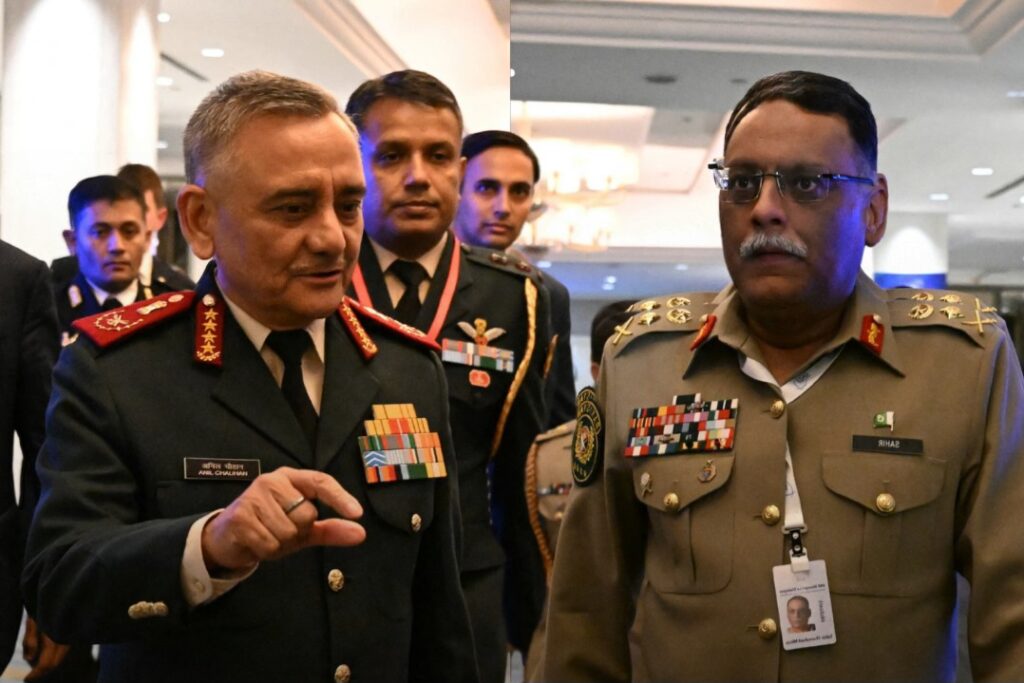At the Shangri-La Dialogue, top Indian and Pakistani generals exchanged strong warnings, signaling a new red line on cross-border terrorism and regional security tensions.

India and Pakistan’s top military officials exchanged sharp warnings and clearly defined their national red lines during the Shangri-La Dialogue in Singapore. The tense exchange comes in the wake of last month’s brief yet intense military confrontation between the two nuclear-armed rivals, amid ongoing diplomatic efforts and strategic reassessments.
Tensions that had been steadily escalating came to a head with the deadly terror attack in Pahalgam, Jammu and Kashmir, this April—an incident New Delhi has attributed to militants based in Pakistan. These underlying strains were evident at the conference, where both nations seized the global stage to defend their positions and strategic decisions.
Chief of Defence Staff General Anil Chauhan emphasized India’s firm stance of zero tolerance against terrorism, referencing Operation Sindoor — a military operation initiated on May 7 aimed at dismantling terror infrastructure in Pakistan and Pakistan-occupied Kashmir (PoK).
India has drawn a firm new red line of zero tolerance towards terrorism,” said General Chauhan.
“I hope this operation, which falls squarely within the military domain, sends a clear message to our adversaries. They must understand that this marks the threshold of India’s patience—and any further provocation will not go unanswered.
Operation Sindoor was launched in response to the April 22 terror attack that claimed 26 lives and triggered a four-day cross-border conflict, which ended on May 10.
“We’ve endured this proxy war of terror for over two decades, suffering heavy losses,” he said. “Now, we are determined to bring it to an end.”
Pakistan firmly denied the allegations and issued strong warnings against the risks of escalating tensions.
General Sahir Shamshad Mirza, Chairman of Pakistan’s Joint Chiefs of Staff Committee, cautioned, “Lowering the threshold of strategic stability to such dangerous levels raises serious concerns.
There is a real possibility that, before the international community can intervene, significant damage and destruction may already occur.”
Despite the rhetoric, both sides have altered their diplomatic approach. India has dispatched several delegations around the world to garner support and influence the global narrative. Congress leader and former foreign minister Salman Khurshid, who was part of a delegation to Singapore, described it as an extraordinary diplomatic effort.
Khurshid described it as an innovation backed by tremendous support. “You could even say it will help ensure that our narrative is consistently communicated,” he said.
Pakistan is set to begin a similar diplomatic outreach starting June 2.
Table of Contents
Gen Mirza reaffirmed Pakistan’s dedication to combating terrorism, including threats that come across the border from Taliban-controlled Afghanistan. He emphasized the heavy toll terrorism has taken on Pakistan, both economically and in terms of human lives.
The recent conflict was also viewed as a trial of military technology, with India deploying French-made Rafale jets and Pakistan utilizing Chinese J10-C fighters. Both generals emphasized their countries’ diverse and multi-sourced military capabilities.
Chauhan stated, “India does not rely on a single country for its defense requirements.”
Mirza highlighted Pakistan’s international defense partnerships, saying, “Our military equipment comes from the US, Turkey, Italy, the UK, and more.”
As both nations continue to upgrade their arsenals with advanced technologies such as AI, drones, cyber capabilities, and precision weaponry, concerns about the risk of rapid escalation remain high. However, both sides denied involving nuclear weapons in the conflict.
Mirza summed up by saying, “The instruments of modern warfare include artificial intelligence, electronic warfare, cyber operations, precision firepower, and advanced weaponry.
READ ALSO…….Drones Hidden In Trucks”: How Ukraine Struck 5 Airfields Deep Inside Russia














 Categories
Categories








